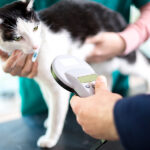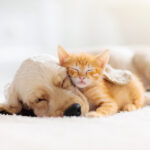If you’ve ever wondered why cat self-grooming is a thing, read on to discover more about this behavior
Did you know that cats spend about half their awake time grooming themselves? Contrary to what you might think, this isn’t all done out of vanity. Cats groom and lick themselves from tip to tail for more than just appearances.
All the licking and pawing do more than just keep them looking fresh and clean. A cat self-grooming is a good barometer for health. A dirty cat, or one with matted fur, is a sign of a health issue and should be addressed by a veterinarian.
If you think about it, cats are the perfect creatures for self-grooming: they are flexible, strategic, and well-equipped for the task with their rough tongues and comb-like paws. They are fine-tuned grooming machines!
So, why do they groom themselves and why so frequently?
3 Reasons For Cat Self-Grooming
Maintains good health.
You might think cats are vain with their aloof attitudes and obsessive grooming, but there’s more to it than looks.
Self-grooming helps your cat maintain healthy skin. Licking their own skin and fur stimulates oil secretions on the skin, which is then spread over the coat through more licking. The oil protects their coat and gives it a beautiful and shiny appearance. Self-grooming also removes loose hair, prevents matting, and removes dirt and fleas.
Every cat has their own grooming ritual. Some cats start with their whiskers, move to their chins, then their paws. Others may break up their grooming throughout the day as they lounge around and do cat things!
While cat self-grooming is totally normal, excessive grooming could be a sign of illness. If your cat is licking until bald spots appear, this may be a sign of emotional or physical illness, pain, or anxiety.
Displacement behavior
Cats also use grooming as a way to comfort themselves in stressful situations. This type of grooming is considered a displacement behavior.
Similar to a fight or flight response in humans, displacement behaviors are an out-of-context response to anxiety. For example, when faced with an aggressive animal, a cat may be undecided about whether to run or fight its predator. Instead, the cat chooses an unrelated behavior, like rapid licking and grooming.
While this is a normal response in cats, contact your veterinarian if you notice excessive, erratic grooming behaviors.
Express love to another cat
Mutual grooming is one of the behaviors cats use to express love and companionship. In truth, this behavior is more social than it is hygienic, as it helps cats clean those hard-to-reach areas like the back of the neck and the top of the head.
You may notice that your cat will occasionally try to “groom” you too. Combing your hair with its paws, licking your arms, and even accepting your affection are all signs that your cat trusts and loves you.
Self-grooming is a natural part of a cat’s life; however, if you have concerns about the amount of grooming or your cat’s health, give our office a call today.






